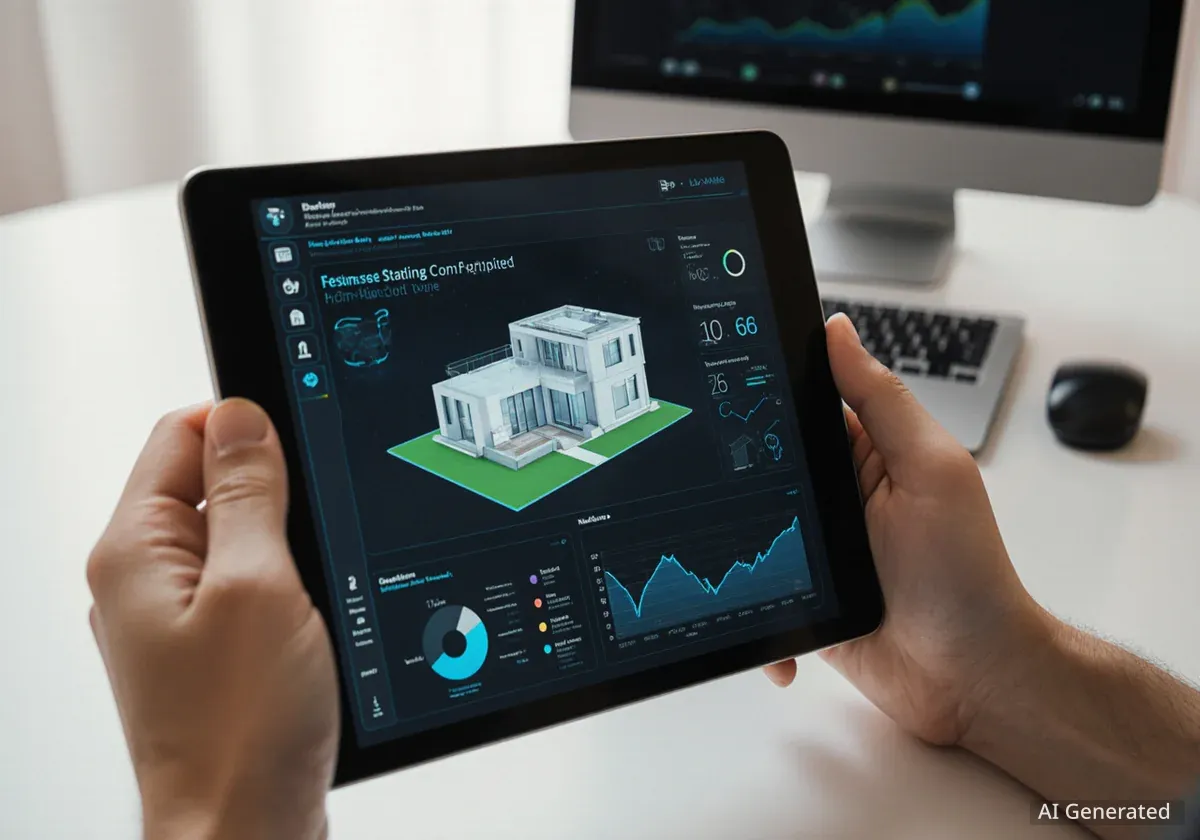A major shift is underway in the high-end real estate market of the Jersey Shore. For the first time in Cape May County, two oceanfront luxury properties with a combined asking price of over $50 million are being offered for sale with the option for buyers to pay in cryptocurrency.
This development signals a growing acceptance of digital assets in traditional high-value transactions. The move aims to attract a new class of international and tech-savvy buyers who prefer the speed and privacy of crypto-based deals.
Key Takeaways
- Two luxury homes in Avalon and Stone Harbor, New Jersey, are now accepting cryptocurrency as payment.
- The properties are a new construction in Avalon listed at $26.5 million and a double-lot estate in Stone Harbor for nearly $25 million.
- This is the first known instance of cryptocurrency being accepted for real estate transactions in Cape May County.
- The move is intended to expand the buyer pool to international clients and those holding significant digital assets.
- Benefits cited for crypto transactions include faster settlement, increased privacy, and the elimination of traditional banking intermediaries.
A New Frontier for Jersey Shore Real Estate
The two properties at the center of this new sales strategy represent the pinnacle of luxury in the area. One is a newly constructed home on Dune Drive in Avalon, with an asking price of $26.5 million. The other is a sprawling double-lot estate located in the south end of Stone Harbor, valued at nearly $25 million.
By opening the door to cryptocurrency, the sellers are tapping into a niche but expanding market of wealthy individuals who hold substantial portions of their net worth in digital currencies like Bitcoin. This strategic decision could set a new precedent for how high-value assets are bought and sold in the region.
Jack Vizzard, a broker with BHHS Fox Roach Realtors who is handling the listings, noted the potential advantages. He explained that such transactions can happen much faster than traditional sales, which often involve lengthy bank processes.
“We believe this will expand the buyer pool to include international clients who prioritize anonymity in transactions and appreciate the absence of bank fees and currency exchange issues,” Vizzard stated.
The Mechanics of a Crypto Real Estate Deal
A real estate transaction using cryptocurrency is fundamentally different from a conventional one. Instead of wire transfers and bank approvals, the process can be as direct as a "wallet-to-wallet" transfer. In this scenario, the buyer sends the agreed-upon amount of cryptocurrency directly from their digital wallet to the seller's wallet.
To manage the inherent volatility of digital currencies, legal agreements are put in place to protect both parties from significant price fluctuations that could occur between the agreement and the final closing. Once the transaction is complete, the seller has the choice to either hold the cryptocurrency as an investment or immediately convert it into traditional currency, such as U.S. dollars.
By the Numbers: Crypto in Real Estate
- $22.5 Million: The price of a Miami Beach penthouse sold entirely for cryptocurrency in 2021.
- $528,900: The value of a Miami condo sold this year in a direct "wallet-to-wallet" Bitcoin transaction.
- 2: The number of luxury properties in Cape May County now open to crypto offers.
Following a National Trend
While this is a first for Cape May County, the use of cryptocurrency in real estate is gaining traction in other luxury markets, particularly in Florida. In 2021, a Miami Beach penthouse made headlines when it sold for $22.5 million, with the entire payment made in digital currency.
More recently, a studio apartment in Miami’s Rider Residences was purchased for $528,900 in Bitcoin. That sale was celebrated as a landmark "wallet-to-wallet" transaction, a direct peer-to-peer exchange without intermediaries. Miami’s mayor, Francis Suarez, even highlighted the deal on social media, calling it an example of the “future of Miami real estate.”
The move in New Jersey suggests this trend is no longer confined to crypto hotspots like Miami. Real estate professionals predict such sales will become more common, especially for high-net-worth individuals looking to diversify their portfolios.
As Vizzard described the logic, the “buyer goes from a very vital asset cryptocurrency which has wild swings and value to a more stable investment and a tangible investment of real estate.”
What is Blockchain Technology?
Cryptocurrency transactions are secured by a technology called blockchain. It is a decentralized, distributed ledger system that records transactions across millions of computers worldwide. This structure makes it extremely difficult to alter records or commit fraud, such as attempting to spend the same digital coin twice. Cryptography is used to scramble the data, ensuring that transactions are both secure and private.
Why Use Crypto for Property Purchases?
The appeal of using cryptocurrency for multi-million dollar purchases extends beyond novelty. Proponents point to several practical benefits that streamline the often cumbersome process of buying property.
Key Advantages of Crypto Transactions:
- Speed: Digital currency transfers can be completed in minutes or hours, compared to the days or weeks required for international wire transfers and bank clearances.
- Reduced Costs: By bypassing banks, buyers and sellers can avoid wire transfer fees, currency exchange fees, and other traditional banking charges.
- Privacy: While not completely anonymous, crypto transactions offer a greater degree of privacy than conventional financial systems, which is a priority for some high-profile buyers.
- Accessibility: For international buyers, using cryptocurrency can eliminate the complexities and hurdles associated with moving large sums of money across borders.
- Asset Conversion: It provides a direct path for crypto investors to convert volatile digital assets into a stable, tangible asset like real estate without first having to cash out through a bank.
The rise in interest for peer-to-peer currencies grew significantly after the 2008 financial crisis, which fostered a distrust of traditional banking and government-controlled currencies among some investors. This sentiment helped fuel the development and adoption of decentralized digital currencies.
As the digital economy continues to evolve with concepts like non-fungible tokens (NFTs) and digital art, its integration with tangible assets like real estate appears to be a natural next step. The listings in Avalon and Stone Harbor are a clear indication that this future is already arriving at the Jersey Shore.





